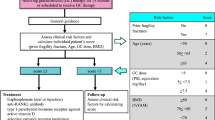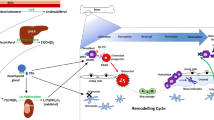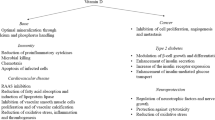Abstract
CO-releasing molecules (CORMs) are a new class of drugs able to release small amounts of CO in biological systems. We have shown previously that one of these molecules, CORM-3, exerts anti-inflammatory effects in animal models. The aim of this study was to assess the effects of CORM-3 on bone metabolism in a model of postmenopausal rheumatoid arthritis osteoporosis. Ovariectomy was followed by collagen-induced arthritis in female DBA-1/J mice. Animals showing arthritis on day 22 after immunization were then randomized into control and treatment groups. CORM-3 was administered at 10 mg/kg, intraperitoneally, once a day. Alendronate was administered at 100 μg/kg, orally, once a day. On days 36 and 50 after immunization, animals were killed and tissues analyzed. The arthritic score was significantly reduced by CORM-3 but not by alendronate treatment. Histopathological analyses indicated that both compounds reduced cellular infiltration and cartilage degradation. Local bone erosion and reduction in TNFα levels were seen for CORM-3 on day 50 and for alendronate on day 36. Serum levels of COMP, IL-6, MMP-3, CTX-I, alkaline phosphatase, and osteocalcin were decreased by both treatments, whereas TNFα levels were reduced by CORM-3 and TRAP-5b by alendronate. Micro-computed tomographic analysis showed protective effects on trabecular bone, which were more prominent for CORM-3 on day 36 and for alendronate on day 50. Our results suggest that CORMs represent a novel anti-inflammatory strategy to counteract joint bone erosion with partial protective effects on systemic bone loss in postmenopausal rheumatoid arthritis.






Similar content being viewed by others
References
Goldring SR, Gravallese EM (2000) Mechanisms of bone loss in inflammatory arthritis: diagnosis and therapeutic implications. Arthritis Res 2:33–37
Forsblad DH, Larsen A, Waltbrand E, Kvist G, Mellstrom D, Saxne T, Ohlsson C, Nordborg E, Carlsten H (2003) Radiographic joint destruction in postmenopausal rheumatoid arthritis is strongly associated with generalised osteoporosis. Ann Rheum Dis 62:617–623
Goemaere S, Ackerman C, Goethals K, De Keyser F, Van der Straeten C, Verbruggen G, Mielants H, Veys EM (1990) Onset of symptoms of rheumatoid arthritis in relation to age, sex and menopausal transition. J Rheumatol 17:1620–1622
D’Elia HF, Larsen A, Mattsson LA, Waltbrand E, Kvist G, Mellstrom D, Saxne T, Ohlsson C, Nordborg E, Carlsten H (2003) Influence of hormone replacement therapy on disease progression and bone mineral density in rheumatoid arthritis. J Rheumatol 30:1456–1463
Storm T, Thamsborg G, Steiniche T, Genant HK, Sorensen OH (1990) Effect of intermittent cyclical etidronate therapy on bone mass and fracture rate in women with postmenopausal osteoporosis. N Engl J Med 322:1265–1271
Eggelmeijer F, Papapoulos SE, van Paassen HC, Dijkmans BA, Valkema R, Westedt ML, Landman JO, Pauwels EK, Breedveld FC (1996) Increased bone mass with pamidronate treatment in rheumatoid arthritis: results of a three-year randomized, double-blind trial. Arthritis Rheum 39:396–402
Breuil V, Euller-Ziegler L (2006) Bisphosphonate therapy in rheumatoid arthritis. Joint Bone Spine 73:349–354
Motterlini R, Otterbein LE (2010) The therapeutic potential of carbon monoxide. Nat Rev Drug Discov 9:728–743
Alcaraz MJ, Guillen MI, Ferrandiz ML, Megias J, Motterlini R (2008) Carbon monoxide-releasing molecules: a pharmacological expedient to counteract inflammation. Curr Pharm Des 14:465–472
Ferrándiz ML, Maicas N, Garcia-Arnandis I, Terencio MC, Motterlini R, Devesa I, Joosten LAB, van den Berg WB, Alcaraz MJ (2008) Treatment with a CO-releasing molecule (CORM-3) reduces joint inflammation and erosion in murine collagen-induced arthritis. Ann Rheum Dis 67:1211–1217
Maicas N, Ferrandiz ML, Devesa I, Motterlini R, Koenders MI, van den Berg WB, Alcaraz MJ (2010) The CO-releasing molecule CORM-3 protects against articular degradation in the K/BxN serum transfer arthritis model. Eur J Pharmacol 634:184–191
Jochems C, Islander U, Erlandsson M, Verdrengh M, Ohlsson C, Carlsten H (2005) Osteoporosis in experimental postmenopausal polyarthritis: the relative contributions of estrogen deficiency and inflammation. Arthritis Res Ther 7:R837–R843
Clark JE, Naughton P, Shurey S, Green CJ, Johnson TR, Mann BE, Foresti R, Motterlini R (2003) Cardioprotective actions by a water-soluble carbon monoxide-releasing molecule. Circ Res 93:e2–e8
Kind PR, King EJ (1954) Estimation of plasma phosphatase by determination of hydrolysed phenol with amino-antipyrine. J Clin Pathol 7:322–326
Feldkamp LA, Davis LC, Krettek C (1984) Practical cone-beam algorithm. J Opt Soc Am A 1:612–619
Remy E, Thiel E (2002) Medial axis for chamfer distances: computing look-up tables and neighbourhoods in 2D or 3D. Pattern Recognit Lett 23:649–661
Ulrich D, van Rietbergen B, Laib A, Ruegsegger P (1999) The ability of three-dimensional structural indices to reflect mechanical aspects of trabecular bone. Bone 25:55–60
Urquhart P, Rosignoli G, Cooper D, Motterlini R, Perretti M (2007) Carbon monoxide-releasing molecules modulate leukocyte–endothelial interactions under flow. J Pharmacol Exp Ther 321:656–662
Adami S, Bhalla AK, Dorizzi R, Montesanti F, Rosini S, Salvagno G, Lo Cascio V (1987) The acute-phase response after bisphosphonate administration. Calcif Tissue Int 41:326–331
Makkonen N, Salminen A, Rogers MJ, Frith JC, Urtti A, Azhayeva E, Monkkonen J (1999) Contrasting effects of alendronate and clodronate on RAW 264 macrophages: the role of a bisphosphonate metabolite. Eur J Pharm Sci 8:109–118
Nakamura M, Ando T, Abe M, Kumagai K, Endo Y (1996) Contrast between effects of aminobisphosphonates and non-aminobisphosphonates on collagen-induced arthritis in mice. Br J Pharmacol 119:205–212
Deng X, Yu Z, Funayama H, Yamaguchi K, Sasano T, Sugawara S, Endo Y (2007) Histidine decarboxylase–stimulating and inflammatory effects of alendronate in mice: involvement of mevalonate pathway, TNFalpha, macrophages, and T-cells. Int Immunopharmacol 7:152–161
D’Amelio P, Grimaldi A, Cristofaro MA, Ravazzoli M, Molinatti PA, Pescarmona GP, Isaia GC (2010) Alendronate reduces osteoclast precursors in osteoporosis. Osteoporos Int 21:1741–1750
Ribbens C, Porras M, Franchimont N, Kaiser MJ, Jaspar JM, Damas P, Houssiau FA, Malaise MG (2002) Increased matrix metalloproteinase-3 serum levels in rheumatic diseases: relationship with synovitis and steroid treatment. Ann Rheum Dis 61:161–166
Okada Y, Nagase H, Harris ED Jr (1987) Matrix metalloproteinases 1, 2, and 3 from rheumatoid synovial cells are sufficient to destroy joints. J Rheumatol 14(spec no):41–42
Mamehara A, Sugimoto T, Sugiyama D, Morinobu S, Tsuji G, Kawano S, Morinobu A, Kumagai S (2010) Serum matrix metalloproteinase-3 as predictor of joint destruction in rheumatoid arthritis, treated with non-biological disease modifying anti-rheumatic drugs. Kobe J Med Sci 56:E98–E107
Fujikawa K, Kawakami A, Tamai M, Uetani M, Takao S, Arima K, Iwamoto N, Aramaki T, Kawashiri S, Ichinose K, Kamachi M, Nakamura H, Origuchi T, Ida H, Aoyagi K, Eguchi K (2009) High serum cartilage oligomeric matrix protein determines the subset of patients with early-stage rheumatoid arthritis with high serum C-reactive protein, matrix metalloproteinase-3, and MRI-proven bone erosion. J Rheumatol 36:1126–1129
Lehmann HJ, Mouritzen U, Christgau S, Cloos PA, Christiansen C (2002) Effect of bisphosphonates on cartilage turnover assessed with a newly developed assay for collagen type II degradation products. Ann Rheum Dis 61:530–533
Shirai T, Kobayashi M, Nishitani K, Satake T, Kuroki H, Nakagawa Y, Nakamura T (2011) Chondroprotective effect of alendronate in a rabbit model of osteoarthritis. J Orthop Res 29:1572–1577
Ralston SH, Hacking L, Willocks L, Bruce F, Pitkeathly DA (1989) Clinical, biochemical, and radiographic effects of aminohydroxypropylidene bisphosphonate treatment in rheumatoid arthritis. Ann Rheum Dis 48:396–399
Zhang Q, Badell IR, Schwarz EM, Boulukos KE, Yao Z, Boyce BF, Xing L (2005) Tumor necrosis factor prevents alendronate-induced osteoclast apoptosis in vivo by stimulating Bcl-xL expression through Ets-2. Arthritis Rheum 52:2708–2718
Kitazawa R, Kimble RB, Vannice JL, Kung VT, Pacifici R (1994) Interleukin-1 receptor antagonist and tumor necrosis factor binding protein decrease osteoclast formation and bone resorption in ovariectomized mice. J Clin Invest 94:2397–2406
Cenci S, Weitzmann MN, Roggia C, Namba N, Novack D, Woodring J, Pacifici R (2000) Estrogen deficiency induces bone loss by enhancing T-cell production of TNF-alpha. J Clin Invest 106:1229–1237
Nanes MS (2003) Tumor necrosis factor-alpha: molecular and cellular mechanisms in skeletal pathology. Gene 321:1–15
Ochi S, Shinohara M, Sato K, Gober HJ, Koga T, Kodama T, Takai T, Miyasaka N, Takayanagi H (2007) Pathological role of osteoclast costimulation in arthritis-induced bone loss. Proc Natl Acad Sci USA 104:11394–11399
Jilka RL, Hangoc G, Girasole G, Passeri G, Williams DC, Abrams JS, Boyce B, Broxmeyer H, Manolagas SC (1992) Increased osteoclast development after estrogen loss: mediation by interleukin-6. Science 257:88–91
Axmann R, Bohm C, Kronke G, Zwerina J, Smolen J, Schett G (2009) Inhibition of interleukin-6 receptor directly blocks osteoclast formation in vitro and in vivo. Arthritis Rheum 60:2747–2756
Song H, Bergstrasser C, Rafat N, Hoger S, Schmidt M, Endres N, Goebeler M, Hillebrands JL, Brigelius-Flohe R, Banning A, Beck G, Loesel R, Yard BA (2009) The carbon monoxide releasing molecule (CORM-3) inhibits expression of vascular cell adhesion molecule-1 and E-selectin independently of haem oxygenase-1 expression. Br J Pharmacol 157:769–780
Wei Y, Chen P, De Bruyn M, Zhang W, Bremer E, Helfrich W (2010) Carbon monoxide–releasing molecule-2 (CORM-2) attenuates acute hepatic ischemia reperfusion injury in rats. BMC Gastroenterol 10:42
Martin T, Gooi JH, Sims NA (2009) Molecular mechanisms in coupling of bone formation to resorption. Crit Rev Eukaryot Gene Expr 19:73–88
Cantatore FP, Acquista CA, Pipitone V (1999) Evaluation of bone turnover and osteoclastic cytokines in early rheumatoid arthritis treated with alendronate. J Rheumatol 26:2318–2323
Alcaraz MJ, Fernandez P, Guillen MI (2003) Anti-inflammatory actions of the heme oxygenase-1 pathway. Curr Pharm Des 9:2541–2551
Zwerina J, Tzima S, Hayer S, Redlich K, Hoffmann O, Hanslik-Schnabel B, Smolen JS, Kollias G, Schett G (2005) Heme oxygenase 1 (HO-1) regulates osteoclastogenesis and bone resorption. FASEB J 19:2011–2013
Lin TH, Tang CH, Hung SY, Liu SH, Lin YM, Fu WM, Yang RS (2010) Upregulation of heme oxygenase-1 inhibits the maturation and mineralization of osteoblasts. J Cell Physiol 222:757–768
Acknowledgments
This study was supported by grants SAF2010-22048 and RETICEF RD06/0013/2001 (Ministerio de Economía y Competitividad, ISCIII, FEDER) and Prometeo2010-047 (Generalitat Valenciana). L. I. is the recipient of an FPI fellowship (Ministerio de Economía y Competitividad). The authors thank Prof. Brian Mann for the synthesis of CORM-3.
Author information
Authors and Affiliations
Corresponding author
Additional information
The authors have stated that they have no conflict of interest.
Rights and permissions
About this article
Cite this article
Ibáñez, L., Alcaraz, M.J., Maicas, N. et al. Downregulation of the Inflammatory Response by CORM-3 Results in Protective Effects in a Model of Postmenopausal Arthritis. Calcif Tissue Int 91, 69–80 (2012). https://doi.org/10.1007/s00223-012-9612-7
Received:
Accepted:
Published:
Issue Date:
DOI: https://doi.org/10.1007/s00223-012-9612-7




